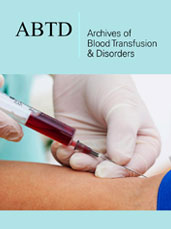- Submissions
Abstract
Archives of Blood Transfusion & Disorders
Platelets from Patients with Hereditary Dense- Granule Disorders Support Surface-Associated Factor XII Activation
-
Open or Close Natalia V Zakharova1,2*, Nadezhda A Podoplelova1, Herve Chambost3, Alexei L Drobyshev4 and Irina A Demina1
1Federal Research and Clinical Centre of Paediatric Haematology, Oncology and Immunology (Rogachev Centre), Russia
2Emanuel Institute for Biochemical Physics, Russian Academy of Sciences, Russia
3Aix Marseille Université, 13005 Marseille, France
4Centre for Theoretical Problems of Physicochemical Pharmacology, Russia
*Corresponding author: NV Zakharova, Federal Research and Clinical Centre of Paediatric Haematology, Oncology and Immunology, 1 Samory Mashela Str, 117997 Moscow, Russia
Submission: August 22, 2017; Published: October 16, 2017

ISSN: 2578-0239Volume1 Issue1
Abstract
Identifying the mechanisms underlying the contribution of coagulation factor XII (fXII) to arterial thrombosis is of particular clinical interest. The physiological importance of platelet dense granules-derived polyphosphates in fXII activation is a subject of intense discussion and controversy. Our previous study suggested that the potently activated platelet-surface plays the more essential role in fXII activation. We, therefore, assayed the plasma fXII activation by potently stimulated platelets from a variety of patients with inherited granule disorders to clarify the possible role of surfaceassociated dense- or α-granule components. The assay was performed with A23187-stimulated platelets washed from secretions containing fXII(a) inhibitors. Platelets from two patients with dense granule defects and one patient with Wiskott-Aldrich syndrome supported surface-associated fXII activation significantly better than platelets from 52 healthy donors. The platelets from two patients with Hermansky-Pudlak syndrome demonstrated no significant difference compared with the donor group. In contrast, platelets from one patient with α,δ-storage pool deficiency as well as platelets from four patients with gray platelet syndrome of different genetic backgrounds did not support fXII activation. The results underscore the non-essential role of dense granule components in platelet surface-associated fXII activation.
 a Creative Commons Attribution 4.0 International License. Based on a work at www.crimsonpublishers.com.
Best viewed in
a Creative Commons Attribution 4.0 International License. Based on a work at www.crimsonpublishers.com.
Best viewed in 







.jpg)






























 Editorial Board Registrations
Editorial Board Registrations Submit your Article
Submit your Article Refer a Friend
Refer a Friend Advertise With Us
Advertise With Us
.jpg)






.jpg)














.bmp)
.jpg)
.png)
.jpg)










.jpg)






.png)

.png)



.png)






